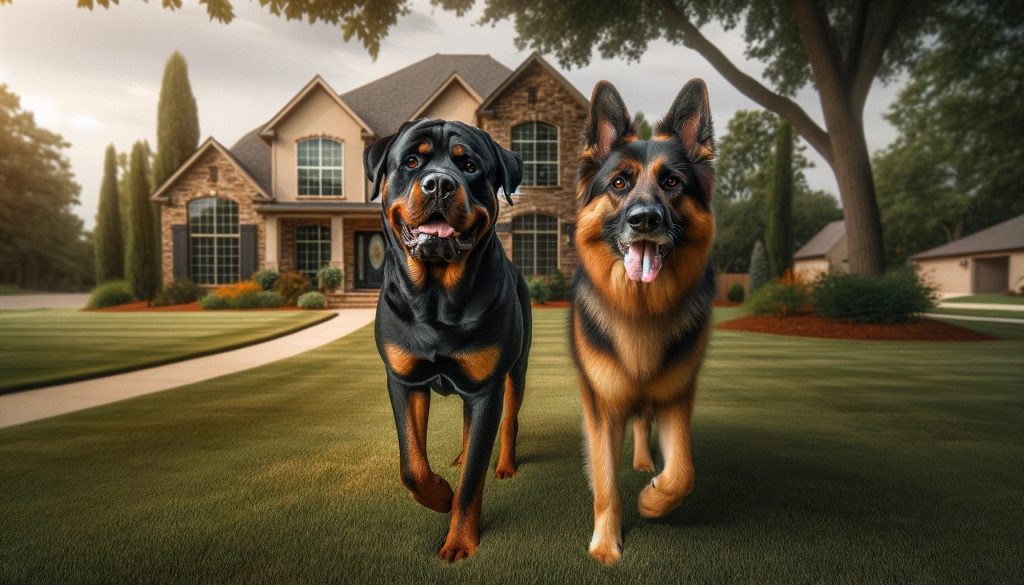There is a common myth surrounding Rottweilers that claims they have a lock jaw, meaning once they bite down, their jaws become locked and cannot be released. However, this belief is entirely unfounded and lacks any factual basis. Rottweilers, like all dogs, do not possess a physical mechanism that causes their jaws to lock.
The misconception of Rottweilers having lock jaws may have stemmed from the reputation of other “aggressive” breeds, such as pit bulls, which have similar-looking head shapes. While it is true that Rottweilers have a strong bite force, there is no locking mechanism involved. It is important to dispel this myth and encourage a more accurate understanding of Rottweilers’ capabilities and behavior.
Key Takeaways:
- Rottweilers do not have lock jaws and there is no mechanism that causes their jaws to lock.
- Proper socialization and training are crucial for ensuring a Rottweiler’s behavior remains safe and controlled.
- The strength of a Rottweiler’s bite is a result of their unique jaw anatomy, including a robust skull and well-developed jaw muscles.
- Genetics and muscle mass play a significant role in determining the bite force of a Rottweiler.
- Behavioral triggers, such as territorial instincts and response to perceived threats, can enhance the intensity of a Rottweiler’s bite.
Understanding Rottweiler Jaw Anatomy
The Rottweiler’s bite strength and jaw power can be attributed to its unique jaw anatomy. With a robust skull and well-developed jaw muscles, these dogs possess impressive biting capabilities. However, it is important to note that there is no locking mechanism in the Rottweiler’s jaw.
Researchers utilize specialized techniques and instruments to measure Rottweiler bite strength, shedding light on their incredible power. By understanding the anatomy of the Rottweiler’s jaw, we gain insight into their exceptional biting abilities.
Factors Influencing Rottweiler Bite Force
The bite force of a Rottweiler is determined by a combination of factors that contribute to their impressive jaw strength. These factors include genetics, muscle mass, and behavioral triggers that enhance the intensity of their bite.
Genetics: Selective breeding has played a significant role in shaping the Rottweiler breed and favoring traits that contribute to powerful bites. Through careful breeding practices, breeders have aimed to enhance the genetic predisposition for a strong bite force in Rottweilers. This means that certain genetic factors can influence the biting capabilities of individual Rottweilers, leading to variations in their strength.
Muscle Mass: The muscular build of a Rottweiler is another crucial factor influencing its biting power. Rottweilers possess well-developed muscles in their jaws, neck, and body, providing them with the necessary strength and power to exert force while biting. A strong, muscular physique enables Rottweilers to deliver powerful bites, potentially capable of exerting significant pressure.
Behavioral Triggers: Beyond genetics and muscle mass, behavioral triggers also play a role in enhancing the bite force of Rottweilers. Territorial instincts and the response to perceived threats can significantly influence their intensity while biting. When a Rottweiler feels threatened or perceives a potential danger, their natural protective instincts may kick in, increasing the force behind their bite. It is essential to understand and manage these triggers to ensure safe interactions with Rottweilers.
Understanding the various factors that influence a Rottweiler’s bite force can help pet owners, trainers, and professionals develop effective strategies for training, socializing, and managing these dogs. By acknowledging the role of genetics, muscle mass, and behavioral triggers, we can better appreciate the unique characteristics of the Rottweiler breed and promote responsible ownership.
Conclusion
Debunking the Rottweiler lock jaw myth is crucial to understanding the true nature of this breed’s bite force. Rottweilers do not possess a locking mechanism in their jaws, contrary to popular belief. Responsible ownership of Rottweilers involves proper training and socialization to ensure their behavior remains safe and controlled.
By providing accurate information and dispelling misconceptions about Rottweilers, we can promote positive relationships and interactions with this loyal and loving breed. It is important to emphasize the importance of responsible ownership, which includes training the dog and ensuring they are well socialized from a young age.
Training and socialization not only help prevent any potential behavioral issues, but they also establish a strong bond between the dog and their owner. Rottweilers can be wonderful companions when raised and cared for correctly, showcasing their true nature as devoted and affectionate pets.





